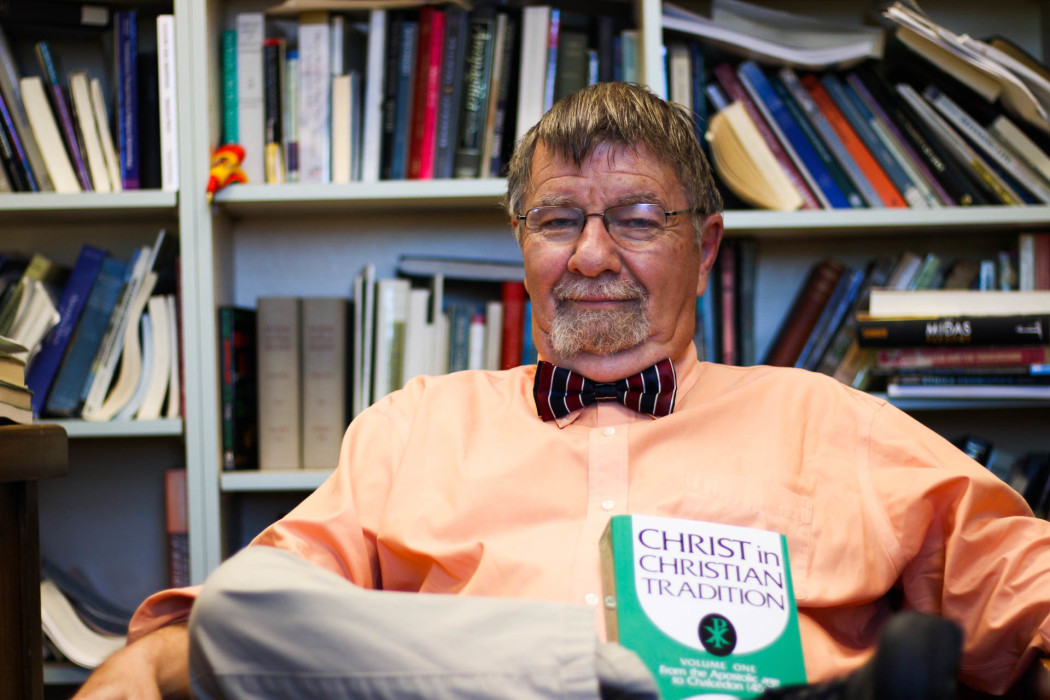A USU hidden secret: Professor Richard Sherlock, from Mormon to Catholic
Richard Sherlock is one of a kind.
He routinely wears a cheetah print bow-tie, there’s a rogue string cheese on the floor under his desk and stacks of books overwhelm his second-floor office of Old Main. But eccentricity aside, Sherlock’s door is always open and he’s considered one of the best kept secrets of Utah State University faculty.
Richard Sherlock is the man to talk to when experiencing a crisis of faith.
In 2010, Sherlock, a professor of philosophy and religion at USU, attended mass in Rome. Raised a Mormon, Sherlock was not at mass that night to receive the Eucharist (the consecrated bread and wine transubstantiated as the body and blood of Jesus Christ). He was merely attending an international conference at Pontifical University of the Holy Cross, delivering a philosophical paper.
He did not anticipate going to Rome for work only to realize the true desires of his heart to become a Catholic, but when his epiphany surfaced, there was no denying it. “I [had] finally heard his voice and I [would] not turn away,” he said.
Sherlock lives to teach. His students adore him and his lectures are empowering. Most of all, Sherlock recognizes the vitality of curiosity, philosophy and debate in finding one’s way in the confusing whirlwind of religion. Sherlock is a philosopher.
“My biggest issue in the Church [of Jesus Christ of Latter-day Saints],” he said, “was that there was no room for questioning the doctrines that just don’t hold any theological weight.”
Whether you agree or disagree about his assertions about the Church’s doctrine, Sherlock raises an important question. Is one’s faith stronger under ignorant obedience, or only after one’s tumultuous crisis of doubt? When did curiosity become equated with attack? When did self-discovery become selfishness? Too often in religion people are scared to acknowledge their true feelings because they are afraid of judgement, or appearing noncommittal.
A screwdriver does nothing useful if it sits on a dusty shelf, the plastic seal untouched. Is not a tool such as religion only viable if we’re utilizing it with experimentation and innovation? Even if it turns the tool into a well-worn, banged-up contraption?
“To deny the use of reason in developing our faith, we seem to deny the goodness of God’s creation,” the professor said.
We have to break to be healed. We have to question to understand. We have to explore to find peace.
Sherlock did just this. He did what some Latter-day Saints would consider a huge obstacle to their sense of identity and converted to Catholicism. A father of several adult children, a widower to a Mormon woman and a resident of a state wherein well over half the residents are Latter-Day Saints, Sherlock refused to allow his maturity in life to stand between him and the particular faith he was looking for. Sherlock proved that it is never too late to evaluate where one is spiritually, and wherein the true desires of one’s heart lie.
For Sherlock, it was in Catholicism. He was not “too late” to enjoy the benefits of his newfound conversion— despite even the comment his friend from Harvard back in the seventies made, saying they always knew he was a Catholic. Forty years later, Sherlock made a huge life decision, and did it in such a way that has only given him peace, not the chaos that many envision when they consider switching religions or leaving religion altogether.
“It is daunting transition for some,” Sherlock said empathetically. “But it really wasn’t that big of an interruption for me. I really wasn’t heartbroken. I had found my own way.”
Sherlock proudly considers himself a “richer, truer, deeper Christian than he ever [has] been.” But it took doubt, self-inquiry and courage to get where he is today. Students of mixed backgrounds often visit his office to discuss issues of philosophy and religion. He is open, unguarded and understanding of their questions because he himself has asked the greatest question of all: if faith is a personal journey, then how far is one willing to go to find the peace one is looking for?
Continued in a later feature, learn about Sherlock’s journey into Catholicism and his feelings toward the Church of Jesus Christ.
@viviangates29


Interesting article, which I found through an ecumenical website. Here’s a link to an article I wrote two years ago on the responsibilities of converts to both their new and their old faith traditions. http://revdocbob.blogspot.com.au/2014/03/the-responsibilities-of-converts.html
Hi, Bob. Which website did you find this article at? Thanks for your kind words.
Okay, now its time for a feature, or perhaps a series of articles on people who have taken the opposite route – someone of another faith that choose to join The Church of Jesus Christ of Latter-day Saints. I don’t think you’ve published an article of that type since I was a journalism student at USU in the early ’80s. You’ll have no shortage of people to profile!
Fascinating to learn of a namesake on the other side of the globe engaging with the Roman Catholic tradition! I’m a life-long Anglican Australian, a deacon and priest, teaching theology since the 70s, but for 25 years a member of the Anglican-Roman Catholic International Commission. So, like you but in not quite the same way, my vocation as a Christian has been drawn into engagement with Rome.
Blessings on your new life, Richard – one of these days may we be fully together in Christ!